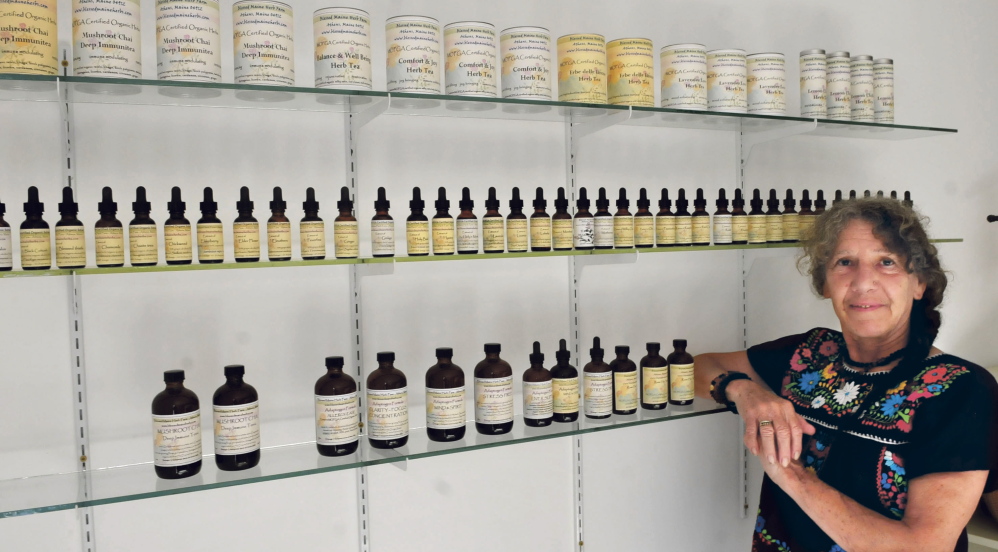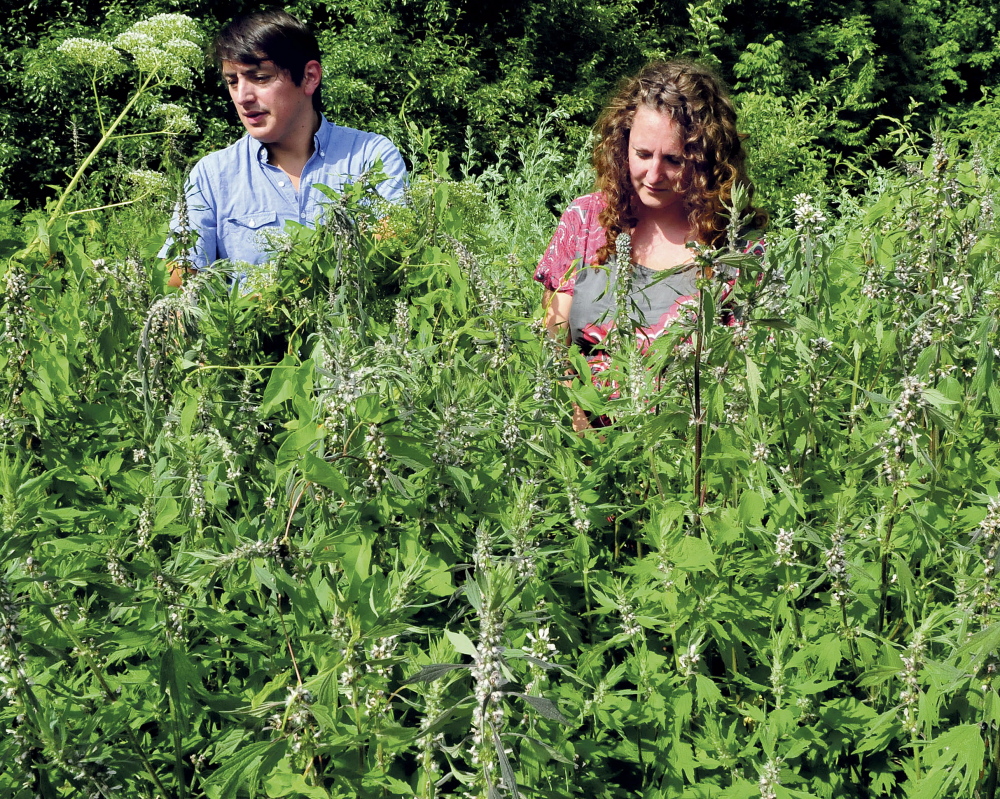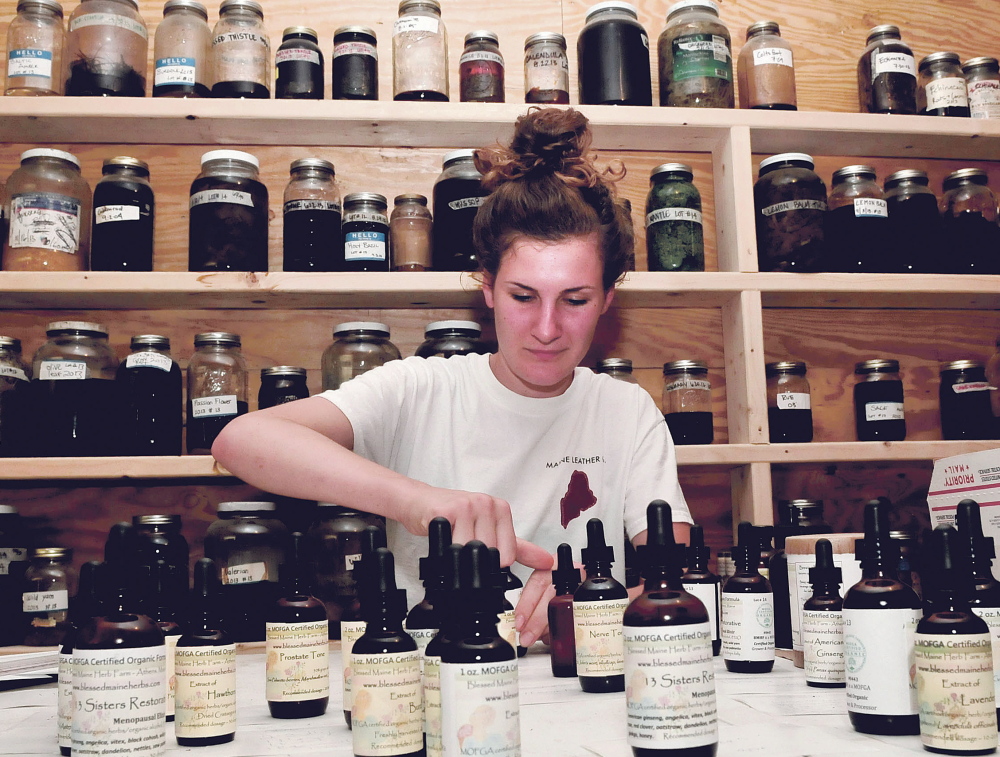WEST ATHENS — The burgeoning farm-to-table food movement in Maine isn’t just about what’s for dinner.
It’s also about medicine making.
It’s about medicinal herbs made into tinctures, infused oils, teas, extracts, body care products and therapeutic formulas to maintain and improve health, said Gail Faith Edwards, founder of Blessed Maine Herb Farm, who is celebrating 25 years in business this year with new construction and farm expansion.
“Everyone talks about local food and how important local foods are. I would like to see local medicine also become part of that discussion,” said Edwards, 65. “All of these plants are our ancestors; they were here long before us. They are the carriers of the vitamins. They store the minerals. Medicinal herbs not only nourish us, they also have great regenerative power.”
She said the herbs that she grows are a life force that no pharmaceutical drug can match. The life force is the regenerative power of organic and wild-gathered herbs, Edwards said.
“If we nourish ourselves with herbs and local foods, we rarely will get sick enough to need medicine,” she said.
THE CASE FOR HERBS
In some studies, herbs clearly perform better than pharmaceuticals, according to data published on line by Mother Earth News. In many cases, herbal therapies may prove to be more economical, more effective and safer – all with fewer side effects – than the pharmaceuticals, according to the website.
Ginger, for example, has been shown to be superior to the pharmaceutical dimenhydrinate (Dramamine) as a preventive therapy for motion sickness. In several recent studies in Europe, St. John’s wort has proven as good as synthetics for treating mild to moderate depression; saw palmetto as good as synthetics for enlarged prostates; ginkgo biloba as good as the first approved synthetic for Alzheimer’s disease. And all have fewer side effects and all are cheaper than the competing synthetics, according to Mother Earth News.
Blessed Maine Herb Farm was established by Edwards on a small parcel of land off Chapman Ridge Road in 1989. She had moved to rural Maine from Hoboken, N.J., in 1973 and started working her farm in 1977. Her four children all were born on the farm with the assistance of a midwife, starting in 1979. The farm, with new buildings and a recent 50-acre expansion, still operates off the grid, powered by solar energy with propane for backup.
“Biological diversity is essential for the health of the Earth and its inhabitants,” Edwards said. “Preserving, revitalizing and supporting sustainable food, fishing, agricultural, as well as herbal medicine, traditions helps to strengthen that diversity.”
The children, now all grown up now, are a big part of the business, which is an organic grower and processor certified by the Maine Organic Farmers and Growers Association.
Daughter Rosa Rosario, 35, who with her husband Adam, 32, run The Pickup Cafe in Skowhegan, has been helping her mother raise and process herbs since she was 10 years old.
“It was second nature to us; we didn’t know anything different,” said Rosa, one of two medicine makers with her mother. “We were always helping with the gardening.”
Daughter Gracie Hilmer, 28, is her mother’s personal assistant and driver; Belle Hilmer, 25, works in shipping, billing and customer service; and John Hilmer, 31, who built the farm’s one-room classroom and did the wood shingling for the new herb processing center, round out the family operation. Belle also has her own leather company, Gracie works for a nonprofit program for mentally disabled adults in Portland, and John has his own construction company on Nantucket Island.
Adam Rosario also is the driver for Edwards’ tours of southern Italy, which she organizes from her family’s ancestral home in the village of Monte San Giacoma. The tours happen every two years and involve only a small group of subscribers who visit many historic sites in the region.
GATHERED WILD
Herbs for tinctures, oils, teas and herbal formulas all are grown or gathered wild on the farm and dried in the upstairs portion of the 30-by-40-foot processing building completed last year with help from a $37,000 grant from the Somerset County Economic Development Corp. and Edwards’ own matching funds. The building also holds a business office and consultation space, a commercial kitchen, a processing room where the herbs are mixed and bottled, and a new store – an apothecary – for public sales of the farm’s herbal products.
“We’re considered part of the agricultural hub in this area, and we employ about seven people, including interns,” Edwards said. “The (Food and Drug Administration) passed these new regulations called the Good Manufacturing Practices, and part of that meant that I had to do some major upgrades to my facility. I had to build a whole separate kitchen for all of the processing. I always just had my home kitchen license.”
GROWERS COOPERATIVE
With the additional work space, Edwards said, she and three other farmers have formed the Maine Organic Herb Growers Cooperative, which produces “milky” oats for a large herb supplier on the West Coast. They hope to begin shipping 500 to 1,000 pounds of “pre-grain” milky oat tops, which are high in calcium, magnesium and B-complex vitamins.
“We hope to grow that cooperative, because that could be a very big boom economically for this area,” she said. “There’s no limit to what we can grow.”
Jim Batey, executive director of the Somerset Economic Development Corp., said the grant money for Blessed Maine Herb Farm originally came from grants awarded to Somerset County through the Elmina B. Sewall Foundation, which supports conservation of the natural environment, primarily in Maine, and the Betterment Fund, a charitable foundation established by the will of the late William Bingham II, a resident of Bethel who died in 1955.
“I’ve been working with Gail off and on for probably four years and kind of watched her business grow, and we helped her in nurturing her business,” Batey said. “With some encouragement from us, probably two years ago, she began to reach out to some other herb growers for herbs in bulk for a company on the West Coast.”
That group became the Maine Organic Herb Growers Cooperative, which took on production of milky oats.
“We saw that as a really good opportunity to grow, not just her business, but to grow this small network of herb growers,” Batey said. “Gail was one of the recipients of that grant money.”
Edwards, who declined to discuss the farm’s annual revenue, also teaches herbal medicine at the farm’s schoolhouse and through correspondence courses. She has written three books about herbal medicine: “Opening Our Wild Hearts to the Healing Herbs, “Traversing the Wild Terrain of Menopause” and “Through the Wild Heart of Mary.”
Edwards said she will expand her growing operation from the current 4 acres of cultivated land to 7 or 8 acres, with the acquisition of 50 acres of abutting land that recently was heavily cut for tree harvesting. The rest, she said, will be turned into a wild plant sanctuary as part of a national organization called United Plant Savers, which concentrates on endangered wild plants that have been over harvested.
Send questions/comments to the editors.






Comments are no longer available on this story